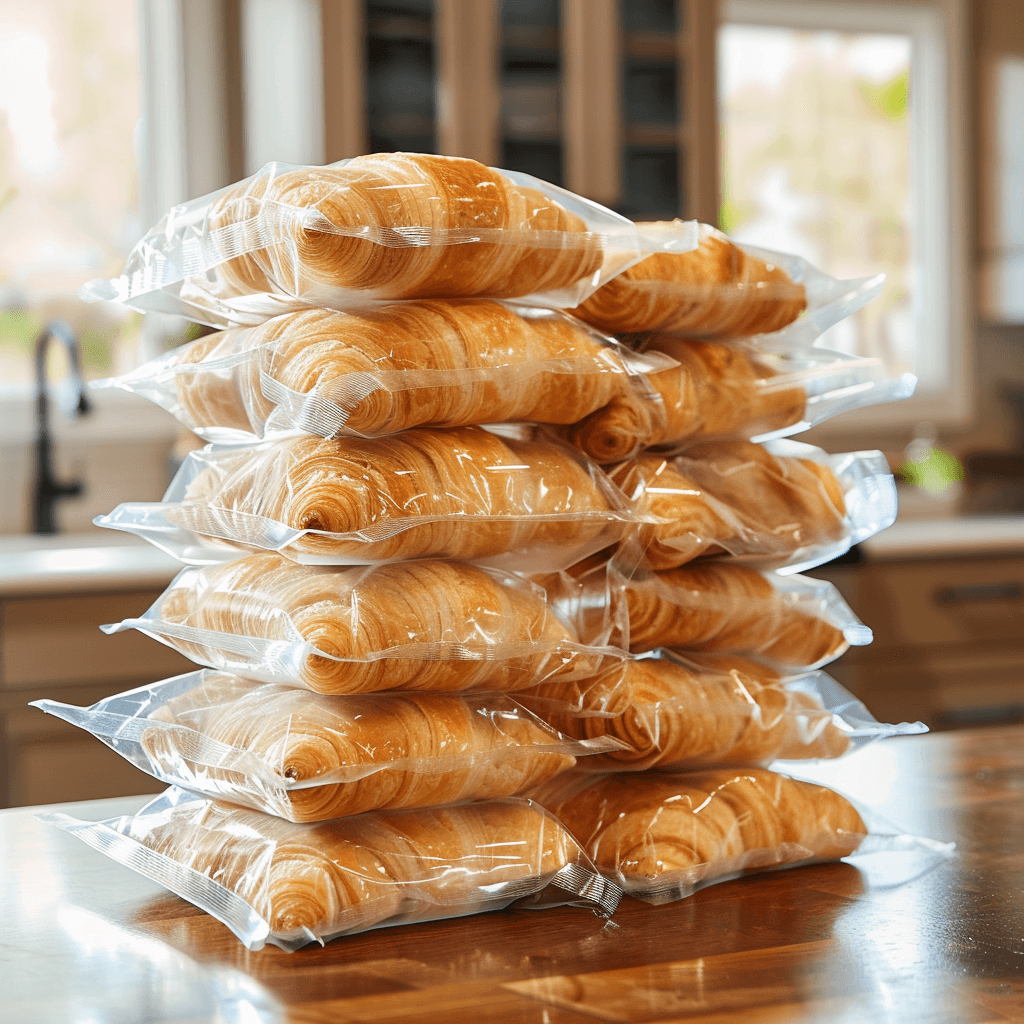Introduction
What is a Croissant?
Croissants are buttery, flaky pastries that look fancy but are surprisingly simple to enjoy. They come from France and use laminated dough. This dough has layers of dough and butter folded together many times. This process creates the crispy layers we all love.

When baked, croissants rise beautifully, giving you a golden, flaky exterior and a soft, airy center. Croissants can be plain, filled with chocolate, or loaded with almond cream. They are tasty treats that feel like a luxury. Enjoying them is easy and requires little effort.

Why People Love Croissants
I get it—croissants are hard to resist. They’re buttery, light, and flaky, yet rich enough to make you feel like you’re treating yourself.
- They’re Perfect Any Time of Day – Breakfast, brunch, or dessert—they fit anywhere.
- Versatility at Its Best – Sweet, savory, or plain, croissants work for every mood.
- They Feel Fancy – Even store-bought croissants feel like a special treat without any effort.
But what happens when you buy too many or bake a large quantity at home? That’s when people start asking—can you freeze croissants and keep that fresh-baked magic?
Can You Freeze Croissant? Quick Answer
Yes, you can freeze croissants—and they freeze exceptionally well! You can store both baked and unbaked croissants in the freezer without losing much of their flavor or texture.
The secret is in the wrapping and reheating techniques, which we’ll cover step-by-step. I’ll show you how to freeze leftovers or prepare dough ahead of time. This way, your croissants will taste just as good as fresh ones.
Why Freeze Croissants?
Preserving Freshness and Flavor
Fresh croissants are incredible, but let’s be honest—they don’t last long. By the second day, they can start losing their crispiness, and after three days, they’re often dry. Freezing is the best way to lock in that buttery flavor and keep the layers intact.
Chef’s Tip:
Wrap each croissant tightly in plastic wrap before sealing them in a freezer bag to prevent air exposure. This keeps them fresh for up to 2 months without losing quality.
Convenience for Busy Schedules
I always keep frozen croissants at home, especially for busy mornings when there’s no time to bake. You can just pop one in the oven for a quick and satisfying breakfast without any prep work.
Quick Ideas for Frozen Croissants:
- Use them for croissant sandwiches—just slice, fill, and reheat.
- Add cheese and ham before reheating for a savory twist.
- Warm them up and top with jam or Nutella for dessert.
Chef’s Hack:
Freeze unbaked croissants if you love the smell of fresh baking in the morning. Just thaw, proof, and bake—they’ll taste like you just made them!
Reducing Food Waste
Let’s face it—we’ve all bought too many croissants at some point. If you have leftovers from brunch or made too much food, freezing is the best way to avoid waste.
What I Do in My Kitchen:
- After baking a large quantity, I freeze extras immediately to keep them fresh.
- I label bags with the date so I can use the oldest ones first.
- If any croissants look stale after thawing, I toast them or turn them into croissant pudding instead of throwing them out.
Can You Freeze Croissants? The Complete Guide
Is It Safe to Freeze Croissants?
Absolutely! Croissants are perfectly safe to freeze, whether they’re baked or unbaked. As long as you wrap them properly, frozen croissants can keep their flaky layers and buttery flavor for weeks.
Key Freezing Tips:
- Cool Completely Before Freezing – Warm croissants create steam and get soggy.
- Double Wrap for Protection – Use plastic wrap first, then place in a freezer bag for extra protection.
- Label Everything – Add a date to the bag so you know when to use them.
Can You Freeze Store-Bought Croissants?
Yes, you can freeze store-bought croissants, and it’s one of the easiest ways to save leftovers. Most store-bought croissants come in paper bags, but you’ll want to repackage them before freezing.
What I Recommend:
- Wrap each croissant in plastic wrap or foil to keep moisture out.
- Place them in a freezer bag and press out excess air.
- Label the bag and freeze for up to 2 months.
Freezing Homemade vs. Store-Bought Croissants
A small difference exists between freezing homemade and store-bought croissants, but both work well with the right prep.
Homemade Croissants:
- Taste fresher but dry out faster if not wrapped well.
- Best for freezing unbaked dough for fresh-baked results later.
Store-Bought Croissants:
- Often have stabilizers that help them hold up better in the freezer.
- These baked goods are perfect for quick breakfasts since you can easily reheat them.
Chef’s Tip:
Freeze unbaked croissants if you prefer the fresh-from-the-oven taste. Simply thaw, proof, and bake when ready.
How to Freeze Croissants Step-by-Step
Tools and Materials You’ll Need (Freezer Bags, Wraps, etc.)
Freezing croissants doesn’t require any fancy tools, but having the right materials can make all the difference.
Here’s what I always keep on hand when freezing pastries:
- Plastic Wrap or Aluminum Foil – Wraps tightly to keep moisture out and prevent freezer burn.
- Freezer Bags or Airtight Containers – Seals in freshness and stops odors from creeping in.
- Parchment Paper – Perfect for layering between croissants to prevent sticking.
- Labels and Markers – Essential for marking dates and tracking storage time.
Pro Tip:
Invest in vacuum-sealed bags if you plan to freeze croissants regularly. They remove extra air, giving you longer storage without freezer burn.
Freezing Baked Croissants: Easy Steps
Already baked croissants freeze beautifully if you handle them with care. Here’s my method:

- Cool Completely – Never freeze warm croissants. Let them cool to room temperature first.
- Wrap Individually – Wrap each croissant in plastic wrap or foil to protect those flaky layers.
- Double Wrap for Extra Protection – Place the wrapped croissants in a freezer bag and press out as much air as possible.
- Label and Freeze – Mark the date, then store them in the freezer for up to 2 months.
Chef’s Tip:
If you’re freezing multiple croissants, separate them with parchment paper to avoid sticking.
Freezing Unbaked Croissants: Instructions
Want that fresh-from-the-oven flavor? Freezing unbaked croissants is the way to go.
- Assemble and Shape Dough – Prepare your croissants as usual and shape them.
- Pre-Freeze on a Baking Sheet – Lay them out on a tray lined with parchment paper and freeze until solid (about 2-3 hours).
- Wrap and Store – Wrap each frozen croissant individually and place them in a freezer bag.
- Label and Freeze – Write the date, and freeze for up to 1 month for the best flavor.
Chef’s Tip:
When you are ready to bake, thaw the unbaked croissants in the fridge overnight. Then, let them rise at room temperature for 1-2 hours before baking.
How Long Can You Freeze Croissants?
Ideal Freezing Duration for Croissants
How long do croissants last in the freezer? From my experience, here’s what works best:
- Baked Croissants – Stay fresh for up to 2 months if properly wrapped.
- Unbaked Croissants – Best if used within 1 month, although they can stretch to 6 weeks if stored well.
To achieve the best flavor, I always rotate older batches first to ensure I don’t forget anything in the back of the freezer.
Signs of Freezer Burn or Spoilage
Even frozen food isn’t immune to going bad. Here’s how to tell if your croissants are past their prime:
- Dry, brittle layers – A sign of moisture loss caused by poor wrapping.
- Ice crystals inside the bag – Means moisture has escaped and refrozen.
- Odd smells – Croissants absorb odors easily, so any weird smell is a red flag.
What I Do in My Kitchen:
If I find freezer burn on a croissant, I still reheat it. I use it for bread pudding or croissant sandwiches instead of throwing it away.
How to Prevent Moisture Loss in Frozen Croissants
Moisture loss is one of the biggest problems with frozen pastries, but it’s easy to avoid with a few tricks:
- Double Wrap Everything – Use plastic wrap first, then place croissants in airtight bags.
- Remove Air from Bags – Press out as much air as possible before sealing.
- Layer with Parchment Paper – Keeps croissants from sticking and damaging layers.
- Store Flat – Avoid stacking croissants, which can crush their delicate structure.
Chef’s Tip:
Place a small bowl of water in the oven when reheating frozen croissants to help restore moisture and keep them soft inside.
How to Thaw and Reheat Frozen Croissants
Best Thawing Techniques (Room Temperature vs. Fridge)
Room Temperature Method:
- Place frozen croissants on the counter and let them thaw for 1-2 hours. This works well for baked croissants if you’re in a hurry.
Fridge Method (Better for Unbaked Croissants):
- Transfer croissants to the fridge and let them thaw overnight.
- For unbaked croissants, proof at room temperature for 1-2 hours after thawing.
Chef’s Tip:
For a quick thaw, I’ve used the oven warming drawer set to low heat—just don’t overdo it, or you’ll start baking them.
Reheating for a Freshly Baked Taste
To bring frozen croissants back to life, reheating the right way makes all the difference:
Oven Method (Best Option):
- Preheat oven to 350°F (175°C).
- Place croissants directly on a baking sheet and heat for 5-10 minutes.
- Enjoy warm, flaky layers that taste just like freshly baked.
Toaster Oven Method (For Small Batches):
- Toast for 3-5 minutes at medium heat until warm and crisp.
Chef’s Tip:
Add a sprinkle of water to the baking tray before reheating. It creates steam, which keeps croissants moist inside while crisping the outside.
Can You Microwave Frozen Croissants?
You can, but I wouldn’t recommend it unless you’re in a real hurry. Microwaves tend to make croissants chewy instead of flaky.
If You Must Microwave:
- Wrap the croissant in a damp paper towel to add moisture.
- Heat for 10-15 seconds on low power.
- Finish in a toaster oven for a crispier texture.
Chef’s Tip:
If you’re reheating a filled croissant (like chocolate or almond), microwaving works better since the filling heats evenly. Just don’t skip the toaster step for the crunch!
Special Types of Croissants and Freezing Tips
Can You Freeze Chocolate Croissants?
Yes, chocolate croissants (also called pain au chocolat) freeze just as well as plain croissants. Their rich chocolate filling holds up beautifully in the freezer, making them a perfect treat to keep on hand.
Steps for Freezing Chocolate Croissants:
- Cool Completely – Make sure they’re at room temperature before wrapping.
- Wrap Individually – Use plastic wrap or foil to prevent freezer burn.
- Store in Freezer Bags – Place them in a single layer inside an airtight bag.
- Freeze for Up to 2 Months – Label with the date to track freshness.
Chef’s Tip:
For the best results, reheat frozen chocolate croissants in the oven at 350°F for 8-10 minutes. This keeps the pastry flaky and ensures the chocolate melts perfectly.
Freezing Almond and Filled Croissants
Filled croissants, like almond croissants or jam-filled pastries, need a bit more care because the fillings can sometimes affect texture when frozen.
How to Freeze Filled Croissants:
- Wrap Tightly – Cover each croissant with plastic wrap, ensuring no gaps where air can seep in.
- Double Bag for Extra Protection – Use a freezer bag and remove as much air as possible.
- Label and Freeze – Store for up to 1 month for filled croissants.
Chef’s Tip:
Bakers often top almond croissants with powdered sugar or sliced almonds. Add these toppings after reheating to keep them crisp.
Storing Frozen Croissant Dough
Unbaked croissant dough freezes wonderfully and gives you the freedom to bake fresh pastries whenever you need them.
Freezing Dough Steps:
- Shape the Dough – Roll and shape the croissants as you normally would.
- Flash Freeze on a Tray – Place them on a baking sheet lined with parchment paper and freeze until solid.
- Wrap and Bag – Wrap each croissant in plastic wrap, then store in a freezer bag.
- Freeze for Up to 1 Month – Longer storage can cause the yeast to lose effectiveness.
Chef’s Tip:
Thaw frozen dough in the fridge overnight, then proof at room temperature for 1-2 hours before baking.
Do Croissants Freeze Well? Pros and Cons
Advantages of Freezing Croissants
Freezing croissants is a time-saver and helps reduce food waste, but that’s not all.

- Preserves Freshness – Locks in buttery flavor and flaky layers.
- Convenient for Busy Days – Ready to bake or reheat anytime.
- Reduces Waste – No more throwing out stale croissants.
- Versatile – Works for both baked and unbaked croissants.
Chef’s Tip:
I always keep a stash of frozen croissants for unexpected guests—they’re impressive yet effortless!
Potential Downsides (Texture Changes)
While freezing is effective, it’s not perfect. Here are some common issues:
- Dry Layers – Poor wrapping can cause freezer burn and dryness.
- Soggy Texture – Thawing too quickly can lead to moisture buildup.
- Loss of Flakiness – Microwaving can make croissants chewy instead of crisp.
Chef’s Tip:
Reheat croissants in the oven with a water bath for added moisture and crispness. Avoid microwaving unless you’re short on time.
How to Overcome Freezing Challenges
Here’s how I fix common freezing problems:
- Dry Croissants? Add a damp paper towel while reheating in the oven to restore moisture.
- Lost Crispiness? Use a toaster oven or reheat directly on a baking rack to keep air circulating.
- Sticky Layers? Always layer croissants with parchment paper before freezing to prevent sticking.
Alternative Storage Methods for Croissants
Refrigeration vs. Freezing: Which is Better?
Refrigeration:
- Keeps croissants fresh for 1-2 days, but they lose flakiness quickly.
- Better for short-term storage when you plan to eat them soon.
Freezing:
- Preserves flavor and texture for up to 2 months.
- Perfect for long-term storage and prepping ahead.
Chef’s Recommendation:
Freeze croissants if you won’t eat them within 24 hours—it’s the safer and tastier option.
Using Vacuum Sealers for Longer Storage
Vacuum sealing works wonders for long-term freshness. By removing all the air, it prevents freezer burn and extends shelf life.
Steps for Vacuum Sealing Croissants:
- Wrap each croissant in plastic wrap.
- Seal inside a vacuum bag.
- Freeze for up to 3 months without worrying about texture loss.
Tips for Airtight Packaging
- Double Wrap Everything – First with plastic wrap, then in a freezer bag.
- Remove Air Before Sealing – Press out excess air or use a vacuum sealer.
- Label and Rotate Stock – Always use the oldest croissants first to prevent spoilage.
Conclusion
Final Thoughts on Freezing Croissants
Freezing croissants is one of the best ways to enjoy bakery-quality pastries without worrying about waste. Whether they’re plain, chocolate-filled, or homemade dough, freezing keeps them fresh and ready for whenever the craving hits.
Chef’s Final Tip:
Store a mix of baked and unbaked croissants in your freezer to cover both quick snacks and fresh baking options.
Best Practices for Storing and Enjoying Croissants
- Always wrap tightly and store flat to protect delicate layers.
- Label bags with dates to keep track of storage time.
- Thaw and reheat properly to restore crispiness and flavor.
- Use frozen croissants in creative recipes like sandwiches or bread puddings if they dry out.
Now that you know how to freeze croissants like a pro, you’ll never have to let another pastry go to waste! Whether you’re saving leftovers or prepping ahead, these tips will keep your croissants delicious and flaky every time.